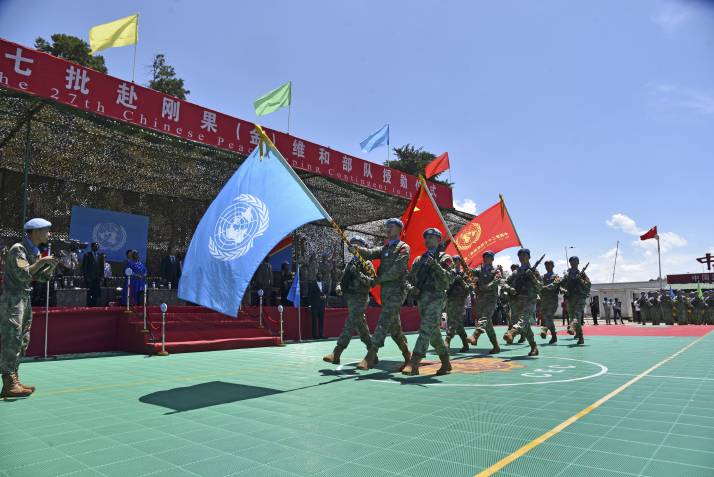| World |
| Mutual respect, genuine connections and sincere dialogue should become the global norm | |
|
|
 Chinese peacekeepers attend an award ceremony at the camp of the Chinese contingent's engineering company on the outskirts of Bukavu, capital of the eastern province of South Kivu, the Democratic Republic of the Congo, on April 9 (XINHUA)
Due to increasingly disordered security, imbalanced development, and ineffective governance across the globe, along with increasing hot-spot conflicts, major power confrontations, and geopolitical contradictions one after another, people are becoming more and more concerned about the future of our planet. "No country, no matter how rich or powerful, can solve the problems facing humanity and Mother Earth on their own. Rather, it's a case that we sink or swim together. United we stand, divided we fall," warned Keith Bennett, a London-based long-time China specialist and vice chair of Britain's 48 Club Group, during a recent international seminar held in Beijing by the The seminar discussed the idea that given the turbulent and intertwined international situation, true multilateralism is an inevitable choice for all humankind in addressing global challenges and promoting global governance. The concept "true multilateralism" was put forward by Chinese President Xi Jinping for the first time at the opening ceremony of the Boao Forum for Asia Annual Conference in April 2021. It is increasingly gaining support from the international community, enhancing unity and cooperation among countries, and demonstrating its contemporary significance and practical implications, Miao Deyu, Chinese Assistant Minister of Foreign Affairs, said during the seminar. Against pseudo-multilateralism The world is navigating a new period of volatility and transformation, where emerging challenges and longstanding issues collide and intersect, reads the report. "This complex dynamic has deeply shaken the international system and order, casting a shadow of instability across the globe." Mauricio Hurtado, Chilean Ambassador to China, said countries should engage in international cooperation, share responsibilities, and address issues together. "I would like to reiterate the importance of collective thinking about the future," he added. This demands a commitment to true multilateralism. "The international community must urgently revise and adapt the global system and order to reflect the evolving international landscape. It is essential to significantly increase the representation and influence of emerging markets and developing countries, promote greater democracy in international relations, and advocate for the reform and enhancement of the worldwide governance system," reads the report. To uphold true multilateralism, countries should firmly safeguard the authority and status of the United Nations, act on the principle of extensive consultation, joint contribution and shared benefits, and oppose unilateralism and all forms of pseudo-multilateralism, Miao added. In real international politics, unilateralism, retrogression and power never show their true colors, but always wear the cloak of morality and righteousness and dress themselves up as "justice". Unilateralists often seek to mask their coercive tactics under the guise of "multilateral action" by pulling in a handful of "minor participants," thereby creating a facade of pseudo-multilateralism. Pseudo-multilateralism would often hinder the effectiveness of UN institutions, as it maintains an unfair position on several international hot-button issues, preventing UN entities from reaching resolutions and fulfilling their mandates, states the report. There are instances when the UN is disregarded and unilateral hegemonic policies are implemented, undermining the UN's role in maintaining international peace and security and posing a risk of marginalizing its relevant functions. Pseudo-multilateralism fosters a "small-circle" governance based on self-interest and self-imposed limitations, champions the zero-sum approach of "I win, you lose," engages in hegemony and bullying, endorses a narcissistic belief in civilizational superiority, and is involved in crafting international commitments that ultimately amount to hollow pledges, according to the report. In contrast to that, Bennett mentioned the Five Principles of Peaceful Coexistence that were proposed 70 years ago by China to contribute to building a just post-war international order and properly managing state-to-state relations. They are: mutual respect for sovereignty and territorial integrity, mutual non-aggression, non-interference in each other's internal affairs, equality and mutual benefit, and peaceful coexistence. According to him, these principles may be taken as the "building blocks and guarantors of true multilateralism," and the most fundamental reform of the global governance system that was hitherto dominated by a handful of nations, most explicitly in Western Europe and North America.  Students and their teacher attend a practical lesson in a tractor workshop at the China-funded Yabassi Technical and Professional Agricultural High School in Yabassi, Cameroon, on January 12, 2023 (XINHUA)
Collective action The collective voice of the Global South has brought a decisive end to the unipolar moment recently enjoyed by a certain country, Bennett said, adding that Global South countries, with China in the forefront, is now the main driver toward multilateralism and the reform of global governance. The Global South refers to the nations of the world that are considered to have a relatively low level of economic and industrial development and are typically located to the south of more industrialized nations. As a major influential player in the international arena, China has demonstrated outstanding performance in practicing multilateralism and transforming the global governance system, Ahmed Mustafa Fahmy, head of the League of Arab States' China Representative Office, said. Under frameworks such as the Belt and Road Initiative, which aims to boost connectivity along and beyond the ancient Silk Road routes, and the China-Arab States Cooperation Forum, China and Arab states have achieved fruitful results in communication and cooperation, according to Fahmy. "The Arab League will unswervingly adhere to the concept of multilateralism, promoting the global governance system toward being more just and reasonable," he added. Oleg Kopylov, Deputy Secretary General of the Shanghai Cooperation Organization (SCO), said the organization has consistently supported multilateralism and the improvement of the global governance system. Following the SCO Astana Summit in July in Kazakhstan, China has officially assumed the rotating presidency of the SCO for 2024-25. It is believed that China will play an even greater role in promoting true multilateralism, he added. According to the report, China has been practicing true multilateralism based on the concept of a community with a shared future for humanity. It has been working to safeguard the UN system and improve multilateral mechanisms. It is continuously providing quality international public goods and upholding that global governance should be promoted in accordance with the law. In 2021, UN Secretary General António Guterres commended China for having become an increasingly important contributor to the work of the UN and a major pillar of international cooperation. Existential threats, whether from the looming threat of climate catastrophe, the danger of nuclear war or a possible pandemic, all show that building such a global community is a worthy goal, one that can be embraced and welcomed by the great majority, Bennett said. China stands ready to work with countries around the world to hold high the banner of true multilateralism and promote the building of a community with a shared future for humanity, Miao concluded. (Print Edition Title: True Multilateralism Explained) Copyedited by G.P. Wilson Comments to mamm@cicgamericas.com |
|
||||||||||||||||||||||||||||||
|